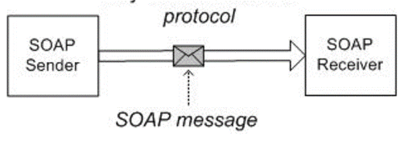Difference between revisions of "Simple Object Access Protocol (SOAP)"
| Line 1: | Line 1: | ||
| − | The official definition, found in the most recent SOAP 1.2 specification, "SOAP is a lightweight protocol intended for exchanging structured information in a decentralized, distributed environment. SOAP uses XML technologies to define an extensible messaging | + | SOAP (Simple Object Access Protocol) is the foundational, XML-based application protocol used to implement Web services within a SOA (Service Oriented Architecture). SOAP is transported primarily via HTTP and middleware messaging systems (JMS, MQ Series, MSMQ, Tuxedo, TIBCO RV) but can also be transported via other protocols such as SMTP (Simple Mail Transfer Protocol) and FTP (File Transfer Protocol).<ref>What is Simple Object Access Protocol (SOAP)? [https://www.f5.com/services/resources/glossary/simple-object-access-protocol-soap F5]</ref> |
| + | |||
| + | The official definition, found in the most recent SOAP 1.2 specification, "SOAP is a lightweight protocol intended for exchanging structured information in a decentralized, distributed environment. SOAP uses XML technologies to define an extensible messaging framework, which provides a message construct that can be exchanged over a variety of underlying protocols. The framework has been designed to be independent of any particular programming model and other implementation specific semantics." This definition really gets to the heart of what SOAP. SOAP defines a way to move XML messages from point A to point B (see Figure below). It does this by providing an XML-based messaging framework that is<br /> 1) extensible,<br /> 2) usable over a variety of underlying networking protocols, and<br /> 3) independent of programming models.<ref>Understanding SOAP [https://msdn.microsoft.com/en-us/library/ms995800.aspx MSDN]</ref> | ||
Revision as of 14:21, 25 August 2022
SOAP (Simple Object Access Protocol) is the foundational, XML-based application protocol used to implement Web services within a SOA (Service Oriented Architecture). SOAP is transported primarily via HTTP and middleware messaging systems (JMS, MQ Series, MSMQ, Tuxedo, TIBCO RV) but can also be transported via other protocols such as SMTP (Simple Mail Transfer Protocol) and FTP (File Transfer Protocol).[1]
The official definition, found in the most recent SOAP 1.2 specification, "SOAP is a lightweight protocol intended for exchanging structured information in a decentralized, distributed environment. SOAP uses XML technologies to define an extensible messaging framework, which provides a message construct that can be exchanged over a variety of underlying protocols. The framework has been designed to be independent of any particular programming model and other implementation specific semantics." This definition really gets to the heart of what SOAP. SOAP defines a way to move XML messages from point A to point B (see Figure below). It does this by providing an XML-based messaging framework that is
1) extensible,
2) usable over a variety of underlying networking protocols, and
3) independent of programming models.[2]

source: [1]
See Also
Enterprise Service Bus (ESB)
Service Oriented Architecture (SOA)
Enterprise Integration
Enterprise Architecture
